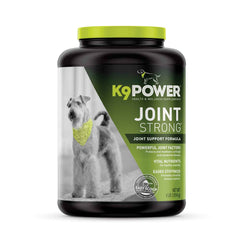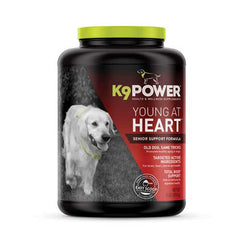Omega 3 Fatty Acids - Will They Help My Dog?
We’ve all likely heard of them before: fatty acids. They’ve been in the mainstream nutritional conversation for years, but what exactly makes them so essential to our overall health and well-being?
The quick chemistry is this:
- We name them “acids” because their pH is less than 7 and “fatty” because they are the building blocks of the fat in our bodies (or our pups’ bodies).
- They are essential, required for good health. However, the body cannot create them on its own, and instead gets them from food.
- Fatty acids are stored in fat cells as triglycerides (groups of three), and the body taps into them for large amounts of energy when needed.
Okay, chemistry lesson over!
Omega 3s have become one of our favorites for good reason. They offer a wide range of health benefits for our dogs. Primarily, they possess a powerful ability to decrease inflammation and help ease arthritis and joint pain due to overuse and old age.
All this in mind, not all Omega 3’s are equally helpful.
EPA, DHA, ALA…. OH MY!
This may feel like a bowl of alphabet soup, but it’s important to understand the three main types of essential fatty acids: EPA, DHA, and ALA.
EPA and DHA (eicosapentaenoic and docosahexaenoic acids) are the two types of omega 3s your dog needs to help treat arthritis. Vets often recommend Omega 3s for aging dogs to help with cognition and mental acuity. The AKC suggests they are great for training, so your puppy-aged and adult aged dogs are great candidates too.
The most potent source of EPA and DHA is fish and algal oils. The third type, ALA, often comes from vegetable oils, like flaxseed, linseed, canola, walnut oil, and soybean oils. Like humans, dogs cannot easily convert ALA into EPA and DHA Omega 3s, so we do not recommend them.
We add cod liver oil and camelina oil to a number of K9 Power products, so you can more efficiently provide your dog with EPA and DHA directly.
Does Omega 3 Help Dogs With Itchy Skin?
If your dog suffers from itchy skin or constantly licks his paws, adding omega 3 fatty acids to his diet can be an effective way to help relieve discomfort. These fatty acids calm your dog’s inflammatory reaction (think: redness and swelling) and can reduce their excessive itching, scratching, and licking.
Additionally, the fatty acid DHA boasts a powerful array of health benefits for dogs of all ages. It’s been shown to aid in the proper brain and eye development of puppies, and can improve cognitive function in older dogs coping with cognitive dysfunction as well as chronic kidney disease.
How Much Omega 3 Should I Give My Dog?
The current recommendation guides us towards 25 mg/kg body weight of DHA and 40 mg/kg body weight of EPA per day.
Omega 3 fatty acids are generally safe, but too much can cause issues in your pup’s GI or circulatory systems. We always recommend having a conversation with your vet if you are unsure about the best levels to provide your pup regularly.
🐾🐾🐾🐾🐾
Final Thoughts
Remember that not all supplements contain Omega 3 fatty acids (EPA and DHA). Some products will “cut corners” with short-chain PUFAs (polyunsaturated fatty acids), like ALA from flaxseed oil. They are technically fatty acids, but it’s not metabolically efficient (or easy) for your dog to convert them into the more beneficial long-chain Omega 3s. Cut straight to the chase with ingredients naturally high in EPA and DHA, like cod liver oil and camelina oil.
Lastly, the overall amount of DHA and EPA in supplements varies immensely. We formulate a number of our supplements with the proper amount of omega 3 fatty acids, so your pup is covered, no matter their current condition or life stage. All of our supplements are safe with commercial dog foods, so you’re covered too!
Explore Our Products Rich In Omega 3s

Make sure your puppy has the best days! Start with a nutritional supplement that delivers important immunity factors, fortifies bones, and builds muscle.

Keep your pup comfortable throughout the day with key nutrients that maintain healthy joints and cartilage.

Shedding is inevitable, but excessive shedding doesn’t have to be. Promote healthy skin and coat with antioxidants and key nutrients for their skin and coat.

Age is just a number. Make their senior years as joyous as their first with nutritional support that keeps them feeling younger and healthier.







Leave a comment